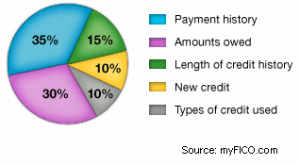 I’m 43 years old and I have a terrible confession to make: I still know my SAT scores by heart. Wait, it gets worse. I still know my PSAT scores by heart. I know, I know, I’m that guy. I’m not proud of this so let’s move on quickly to another semi-related topic: FICO scores.
I’m 43 years old and I have a terrible confession to make: I still know my SAT scores by heart. Wait, it gets worse. I still know my PSAT scores by heart. I know, I know, I’m that guy. I’m not proud of this so let’s move on quickly to another semi-related topic: FICO scores.
Unlike the SAT, everybody should track his or her FICO score throughout adulthood.
I bring up the SAT analogy because you should no more apply for a loan without knowing your FICO score than you would think of applying to college without knowing your SAT score. Like the SAT, FICO serves as a sorting mechanism determining your eligibility, in this case, for lending products.
Any credit card, auto-loan, mortgage, or business loan application you submit will prompt your lender to pull your credit score as a major determinant of your access to their best, or worst, products.
Unlike the SAT, however, you only need to remember one single number to achieve total success: a 720 FICO.
An online universe of FICO-score nerds exists and I’m not writing with that audience in mind, any more than I would encourage SAT nerds to remember their scores 25 years too many. (Yes, I’m looking right at you, mirror.)
FICO determines loan quality
If you’ve got a 720 FICO, considered by most banks the cutoff for “Prime” loans – the ones with the lowest interest rate and best terms – then you can stop nerding out about your FICO score. A higher score than 720 gives you nothing but bragging rights.
If you’ve got lower than a 720 FICO, expect to pay more in fees and interest, with fewer options. Borrowers in the high 600s may still qualify for what’s known in the banking world as “Alt-A” loans. Borrowers with a FICO score in the mid 600s or below either qualify for Subprime loans – a high interest rate, high fees, and somewhat punitive terms – or no loan at all.
What to do
So how do you access your score? The FICO company, as well as the three credit bureaus Equifax, Experian, and TransUnion each offer personal credit reports and scores for less than $20 each. You can spend a couple of minutes online to access your report and score, and I highly recommend doing this before applying for a loan anywhere.
You really don’t need to buy more than one score with one report from one bureau, so you should be able to accomplish your goal for under $20.
Free credit report?
Consumer advocates trumpet the idea that you can get a free credit report each year, which is true.
But that report does not come with a FICO score. I don’t think that a credit report without a credit score fully equips you with all the knowledge that you need.
To return to my college analogy, a free credit report with no FICO score is like a college application full of essays but no SAT score. You are not getting the full benefit of seeing your application the way a bank sees it, which is ultimately one of the main points of reviewing your credit profile. I advocate spending the money to get the score along with your credit report.
Inputs to FICO
So what does FICO measure? The Fair Isaac Corporation, the company behind FICO, reports that five factors go into their mathematical formula, all of them measurements of past borrower behavior.
I’ll list the factors in order of importance, according to their formula.
 First: – Have you ever missed debt payments, and if so, how often and how recently? (35 percent)
First: – Have you ever missed debt payments, and if so, how often and how recently? (35 percent)
Second – How much do you owe now? High debt lowers your score, while low debt compared to your available credit actually raises you score. (30 percent)
Third – How long have you been borrowing money? A longer time raises your score, while a shorter time lowers your score. (15 percent)
Fourth – FICO considers some types of credit like installment loans riskier than other types of credit like mortgage loans, and adjusts your score as a result. (10 percent)
Fifth – Have you applied recently for credit? This lowers your score a bit, as it shows you need to borrow money. (10 percent)
Lesson One: Time
Reviewing these five factors, we can see that the biggest determinant of your score is time: Specifically, are you timely with your bills, and how long have you responsibly handled debt?
Because of the impact of time, even younger borrowers with perfect credit history cannot achieve very high FICO scores (in the 800s), whereas older borrowers have a natural advantage because they may have very ‘old’ credit lines boosting their scores.
Lesson Two: No tricks
You should never make a financial or borrowing decision based on how it will affect your FICO score. Instead, just do the ‘right thing’ in your situation, and the FICO will work itself out. Paying your bills on time, lowering your balances when you can, building up a long-term track record of ‘safe’ borrowing behavior is the only reliable method for boosting your FICO.
Plenty of ‘services’ claim to be able to boost your credit score, but I would never recommend attempting any of these. Like many other areas of finance, the best practice is to ignore short cuts and tricks. Just stay focused on the long-term unsexy practice of paying back your debts. The FICO score will work itself out in the long run.
 When I say you should avoid tricks and mostly ignore your FICO score, I don’t mean to ignore the underlying issue of settling past debts. The best practice is to make like a Lannister, and always pay your debts.
When I say you should avoid tricks and mostly ignore your FICO score, I don’t mean to ignore the underlying issue of settling past debts. The best practice is to make like a Lannister, and always pay your debts.
Next week I’ll write about when to totally ignore your FICO score, but also the financial advantages of not ignoring your FICO.
A version of this post ran in the San Antonio Express News.
Please see related posts:
Ask an ex-banker: FICO scores and monthly balances
FICO Part 2 – When to ignore FICO, and why FICO is awesome
Post read (965) times.




